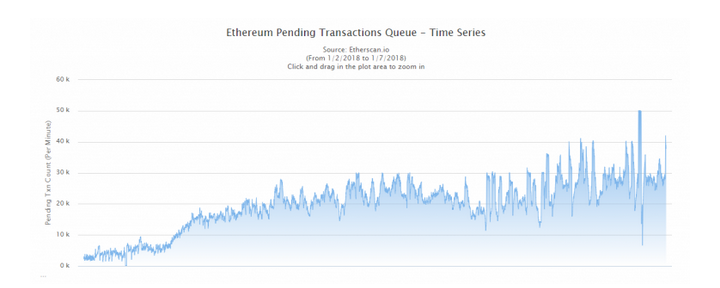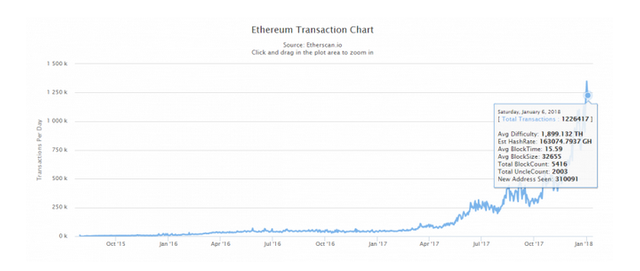Bittrex Stops Creating New Ethereum Deposit Addresses Due to Network Congestion
Bittrex, the third largest cryptocurrency exchange in the global market behind Binance and Bithumb, has temporarily paused Ethereum deposits due to the current congestion on the Ethereum blockchain network.
Network Congestion
According to Etherscan, the Ethereum network is processing more than 1.2 million transactions on a daily basis, settling more payments than all of the cryptocurrencies and blockchain networks in the market combined, including bitcoin.

The Ethereum network has to process more transactions than other blockchain networks because it operates as the base protocol for large-scale decentralized applications. Applications like CryptoKitties and EtherDelta, that have many active users requesting multiple transactions per day, are placing a heavy burden on the Ethereum network.
“While innocuous at a glance, the project has become a problem for the Ethereum ecosystem. The cryptokitties multiply, are bought, sold, rented for breeding, in other words, involved in myriads of transactions, taking up the largest volume of Ethereum traffic (20%). This causes many transactions that had previously taken seconds to currently be either delayed to 10 minutes, or fail entirely,” explained the developers of Bankex that recently introduced the first practical implementation of Buterin’s second-layer solution Plasma.
The congestion of the Ethereum network caused by the rising popularity and activity of decentralized applications can be resolved through second-layer scaling and solutions such as Plasma, Sharding, and Casper. But, as Augur co-founder Joey Krug noted, there are not enough developers working on the core protocol of Ethereum and consequently, Ethereum co-founder Vitalik Buterin stated that fully scaling Ethereum could take two to five years.
Bittrex Disables Deposits
Given the recent increase in the transaction fee of Ether, Bittrex has disabled Ether deposits onto its trading platform temporarily. As seen in the chart below provided by Etherscan, the transaction fee of Ether has increased drastically over the past week, forcing Bittrex to take an extreme approach by disabling Ether deposits onto its platform.

“Due to incredibly high gas prices, we’re preventing new ETH and asset deposit addresses from being created. Existing deposit addresses will work as normal,” said Bittrex.
Gas is the transaction fee paid by decentralized applications to execute operations. On CryptoKitties and EtherDelta for instance, users pay gas to trade digital cartoon kittens or to execute trades on the decentralized cryptocurrency exchange of EtherDelta.
If the gas costs increase due to the congestion on the Ethereum network, it becomes more inefficient and challenging for decentralized applications to operate seamlessly and handle millions of requests in a brief period of time. For this specific reason, Bittrex also disabled new Ether and asset deposit addresses from being created.
Other major cryptocurrency exchanges like Binance and Bithumb have not disabled Ether deposits and the creation of new deposit addresses. Considering the large number of unconfirmed transactions on the Ethereum network, it is likely that Bittrex will disable new deposit addresses from being deployed for a relatively long period of time.
It has also started to cost users more than $1 to send Ether from one address to another. While the current rate of Ether transaction fee could decrease in the short-term, until then, users on exchanges and decentralized applications will struggle.